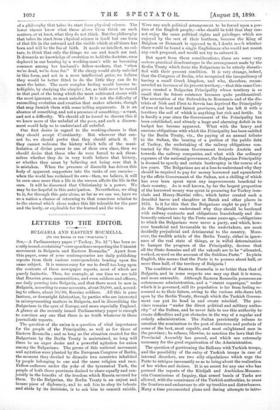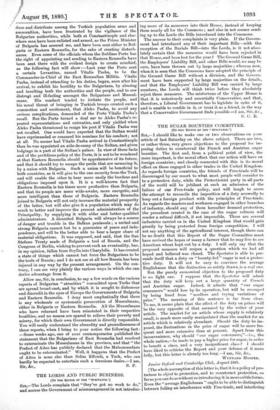LETTERS TO THE EDITOR.
BULGARIA AND EASTERN ROUMELIA.
[TO TUE EDITOR OF TOE `• SPECTATOR:]
SIR,-A Parliamentary paper (" Turkey, No. 1,2 ") has been re- cently issued, containing" correspondence respecting the Unionist movement in Bulgaria and Eastern Ronmelia." Apart from this paper, some of your contemporaries are daily publishing reports from their various correspondents bearing upon the same subject. It is unnecessary for me to dwell too long upon the contents of these newspaper reports, most of which are purely fautastic. Thus, for example, at one time we are told that Russian arms, ammunitions, and even soldiers and officers, are daily pouring into Bulgaria, and that there must be now in Bulgaria, according to some accounts, about 30,000, and, accord- ing to others, about 50,000, Russian soldiers. All this is pure fantasy, or downright fabrication, by parties who are interested in misrepresenting matters in Bulgaria, and in discrediting the Ball.Tarians in the eyes of Europe, and more especially England. A glance at the recently issued Parliamentary paper is enough to convince any one that there is no truth whatever in these journalistic reports.
The question of the union is a question of vital importance for the people of the Principality, as well as for those of Eastern Roumelia ; and so long as the situation created for the Bulgarians by the Berlin Treaty is maintained, so long will there be an eager desire and a powerful agitation for union among the Bulgarians. The germs of this national movement and agitation were'planted by the European Congress of Berlin, the moment they decided to disunite two countries inhabited by people belonging to one and the same religion and race. Fellow-sufferers under the yoke of the tyrannical Turk, the people of both those provinces desired to share equally and con- jointly in the benefits of the freedom which Russia secured for them. To the Bulgarian, the Berlin Treaty is an unjust and Insane piece of diplomacy, and to ask him to obey its behests and abide by its decisions, is to ask him to commit suicide.
Were any such political arrangement to be forced upon a por- tion of the English people,—who should be told that they can- not enjoy the same political rights and privileges which are enjoyed by the rest of their brethren, because the King of Belgium or Denmark is opposed to it, I doubt mach whether there would be found a single Englishman who would not resent. any such proposal, and would not try to subvert it.
But apart from these considerations, there are some very serious practical disadvantages in the arrangement made by the Berlin Treaty which force the Bulgarians to be utterly dissatis- fied with their present condition. It is very strange, indeed, that the Congress of Berlin, who recognised the inexpediency of having a small Greek kingdom, and who, therefore, recom- mended an increase of its present territory,—that this same Con- gress created a Bulgarian Principality whose territory is so small that its future existence becomes quite problematical. The annexation of the Dobrudcha to Roumania and of the dis- tricts of Nish and Pirot to Servia has deprived the Principality of two of its best and fairest provinces, and has left it with is territory, the soil of which is anything but rich and fertile. It is hardly a year since the Government of the Principality has been established, and already a large and alarming deficit in its budget has become apparent. What with the heavy and onerous obligations with which the Principality has been saddled by the Berlin Treaty, viz., the paying of an annual tribute to the Sultan, the bearing of a portion of the public debt of Turkey, the undertaking of the railway obligations con- tracted by the Ottoman Government towards Austria and towards the railway companies, and what with the ordinary expenses of the national government, the Bulgarian Principality is doomed to speedy and certain bankruptcy in the course of a, few years. The Bulgarians are at a loss to understand why they should be required to pay for money borrowed and squandered by the effete Government of the Sultan, not a shilling of which has ever been spent upon any improvements beneficial to' their country. As is well known, by far the largest proportion of the borrowed money was spent in procuring for Turkey iron- clads and Henry-Martini rifles, which latter created such a. dreadful havoc and slaughter at Batak and other places in- 1876. Is it for this that the Bulgarians ought to pay ? Nor do the Bulgarians understand why they should be burdened with railway contracts and obligations fraudulently and dis- honestly entered into by the Porte some years ago,—obligations to which the Bulgarians were never a party, and which, how- ever beneficial and favourable to the undertakers, are most decidedly prejudicial and detrimental to the country. More- over, the twelfth article of the Berlin Treaty, either in ignor- ance of the real state of things, or in wilful determination to hamper the progress of the Principality, decrees that- all the State domains and all the vakoufs are to be "alienated,. worked, or used on the account of the Sublime Porte." In plain English, this means that the Porte is to possess about half, or more than half, of the territory of Bulgaria !
The condition of Eastern Roumelia is no better than that of Bulgaria, and in some respects one may say that it is worse, and more untenable. Although Eastern Routnelia possesses an autonomous administration, and a "statist organique," under which it is governed, still its population is far from feeling re- assured as to their future, owing to the various side-doors left open by the Berlin Treaty, through which the Turkish Govern- ment can put its head in and create mischief. The pro- vince remains "under the direct political and military autho- rity" of the Sultan, and he never fails to use this authority to. create difficulties and put obstacles in the way of a regular and orderly administration. The Sultan persistently refuses to sanction the nomination to the post of directors and prefects of some of the best, most capable, and most enlightened men in the province ; he refuses, likewise, to sanction the laws that the Provincial Assembly has passed, and which are extremely necessary for the good organisation of the Administration.
The question of garrisoning the Balkans with Turkish troops, and the possibility of the entry of Turkish troops in case of internal disorders, are two silly stipulations which urge the Porte to intrigue incessantly so as to bring about the realisation of her wishes and desires. It is no secret for any one who has perused the reports of the Kirdjali and Anchiolou-Messem- vria Commissions of Inquiry, that armed bands of Turks are allowed, with the connivance of the Turkish authorities, to cross the frontiers and endeavour to stir up troubles and disturbances. Many a time preconcerted plans and daring attempts to intro-
duce and distribute among the Turkish population arms and ammunition, have been frustrated by the vigilance of the Bulgarian authorities, while both at Constantinople and else- where men have been enlisted and armed, as the Prime Minister of Bulgaria has assured me, and have been sent either to Bul- garia or Eastern Roumelia, for the sake of creating disturb- ances. Even some of the officials whom the Sublime Porte has the right of appointing and sending to Eastern Roumelia have been sent there with the evident design to create mischief, as the following fact will show :—Last year the Porte sent a certain Levantine, named Vitalis Pasha, to be the Commander-in-Chief of the East Roumelian Militia. Vitalis Pasha, instead of attending to his duties, began, soon after his arrival, to exhibit his hostility to the Bulgarians, by abusing and insulting both the authorities and the people, and to sow distrnat and ill-feeling amongst the Bulgarians and Mussul- mans. His conduct tended to irritate the people, and his usual threat of bringing in Turkish troops created such a commotion and excitement, that Aleko Pasha, to avoid any serious complications, demanded of the Porte Vitalis Pasha's recall. But the Porte turned a deaf ear to Aleko Pasha's re- peated representations and entreaties, and only yielded when Aleko Pasha threatened to resign his post if Vitalis Pasha was not recalled. One would have expected that the Sultan would have reprimanded or censured his nominee for his conduct; not at all. No sooner had Vitalis Pasha arrived in Constantinople than he was appointed an aide-de-camp of the Sultan, and given lodgings in a part of the Sultan's palace. In view of these facts and of the perfidious policy of the Porte, it is not to be wondered at that Eastern Roumelia should be apprehensive of its future, and that it should try to escape the perils that are menacing it, by a union with Bulgaria. Such a union will be beneficial to both countries, as it will give to the one security from the Turk, and will enable the other to bear more easily the burdens and obligations imposed upon it. It is a well-known fact that Eastern Roumelia is ten times more productive than Bulgaria, and that its people are more wide-awake, more energetic, and more intelligent than those of Bulgaria. Eastern Roumelia joined to Bulgaria will not only increase the material prosperity of the latter, but will also give it a population which may do much to better and improve the present administration of the Principality, by supplying it with abler and better-qualified administrators. A disunited Bulgaria will always be a source of danger and trouble in the Balkan peninsula ; a united and strong Bulgaria cannot but be a guarantee of peace and inde- pendence, and will be the better able to bear a larger share of material obligations. It was supposed, and said, that the San Stefano Treaty made of Bulgaria a tool of Russia, and the Congress of Berlin, wishing to prevent such an eventuality, has, in my opinion, fallen from Scylla into Charybdis. It has created a state of things which cannot but force the Bulgarians to be the tools of Russia; and I do not see at all how Russia has been injured in any way by the present arrangement. On the con- trary, I can see very plainly the various ways in which she can derive advantage from it Allow me, Sir, in conclusion, to say a few words on the various reports of Bulgarian " atrocities " committed upon Turks that are spread broad-cast, and by which it is sought to dishonour and discredit in the eyes of Europe the Governments of Bulgaria and Eastern Roumelia. I deny most emphatically that there is any wholesale or systematic persecution of Mussulmans, either in Bulgaria or Eastern Roumelia. All the Mussnlmans who have returned have been reinstated in their respective localities, and no means are spared to relieve their poverty and misery, for which their own Government is directly responsible. You will easily understand the absurdity and groundlessness of these reports, when I bring to your notice the following fact: —Some weeks ago, one of your contemporaries published the statement that the Bulgarians of East Roumelia had resolved to exterminate the Mussnlmans in the province, and that "the Prefect of Aitos has publicly declared that the Mahommedans ought to be exterminated." Well, it happens that the Prefect of Aitos is none else than Selim Effendi, a Turk, who can hardly be expected to entertain such a ferocious desire.—I am,































 Previous page
Previous page